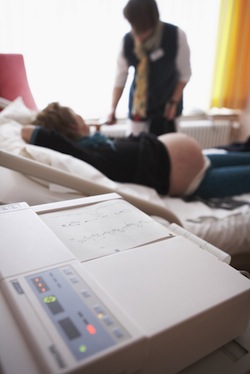Risk of Implantable Cardioverter Defibrillator During Pregnancy
Pregnancy News
Obie Editorial Team
 Implantable cardioverter defibrillators (ICD) are implanted in the body when a patient is at increased risk of cardiac death. The ICD detects heart rhythm and sends a jolt of electricity to the heart when the arrhythmia occurs. According to researchers from the Department of Perinatology and Gynecology at the National Cerebral and Cardiovascular Center, the efficacy of ICD use in the pregnant population has not been effectively studied due to the small number of patients with ICD equipment in place during pregnancy.
Implantable cardioverter defibrillators (ICD) are implanted in the body when a patient is at increased risk of cardiac death. The ICD detects heart rhythm and sends a jolt of electricity to the heart when the arrhythmia occurs. According to researchers from the Department of Perinatology and Gynecology at the National Cerebral and Cardiovascular Center, the efficacy of ICD use in the pregnant population has not been effectively studied due to the small number of patients with ICD equipment in place during pregnancy.
For the sake of the study, researchers evaluated six women with an ICD in place throughout pregnancy. All ICDs were implanted before pregnancy occurred and all ICD remained in place for the duration of the pregnancy. The pregnancies were delivered full-term by C-section at the National Cerebral and Cardiovascular Center.
None of the six women experienced negative side effects or shocks of any kind from the ICD during pregnancy. After pregnancy, in the postpartum period, two women experienced a reduction in heart function and one shock was delivered via ICD. Four women did require an increase to anti-arrhythmic medications after tachyarrhythmia events in the second trimester.
Conclusion: No negative events associated with ICD were evident during pregnancy as long as women received careful prenatal care and delivery.
Source: Miyoshi T, Kamiya CA, Katsuragi S, Ueda H, Kobayashi Y, Horiuchi C, Yamanaka K, Neki R, Yoshimatsu J, Ikeda T, Yamada Y, Okamura H, Noda T, Shimizu W. Safety and Efficacy of Implantable Cardioverter Defibrillator During Pregnancy and After Delivery. Circ J. 2012 Dec 29.
http://www.ncbi.nlm.nih.gov/pubmed/23291990









